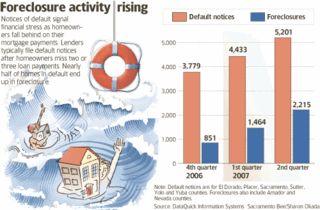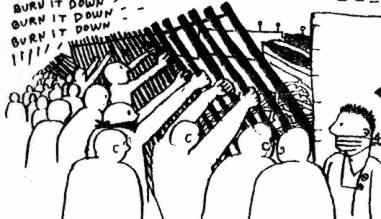
A slow tsunami of debt misery and homelessness is about to roll over the United States, and consequently the rest of us, if the financial markets do not stabilise soon. It’s already on it’s way and picking up speed.
The Sacramento Bee has an excellent report up that puts a human face on the building subprime lending disaster:
Frustrated borrowers who lenders to try to work things out say it’s a fruitless ordeal
By Jim Wasserman – Bee Staff Writer
Published 12:00 am PDT Sunday, September 2, 2007
Story appeared in BUSINESS section, Page D1Tracy Trammell sold the boat, the extra vehicles and tried everything to “find a way to refinance, or do what I could not to lose the house for my children.”
She is in a bind all too common in Sacramento: a home losing value and an adjustable-rate mortgage with payments that jumped $1,000 a month in June.
Thirty days ago, Trammell, a widow and working mother with two daughters, skipped her first payment to Countrywide Financial Corp., a company deep in its own crisis amid a pileup of hardship cases. This month, Trammell will miss a second payment on a refinance loan her late husband handled at the peak of the housing boom in 2005.
After this article was written Countrywide announced the layoff of up to 12,000 employees – most of whom are about to have trouble paying their own home loans too. So it goes, the big wave’s picking up speed.
Bottom line: Neither Trammel nor Calabasas-based Countrywide has yet been able to work out a deal to spare her small house in Citrus Heights from foreclosure. There are no loan modifications. No refinance options. No waiving of a pre-payment penalty that stings a borrower for thousands of dollars to get out of trouble.
“I asked, ‘What’s your solution? Give me some ways I can keep this from happening,’ ” says Trammell of her dealings with the nation’s leading lender. “They said, ‘Get a roommate.’ That’s what she told me. I said, ‘OK. Well, I guess we’re done talking.’ ”
The ceaseless multiplication of this joint impasse helps explain the 617,000 foreclosures during the first seven months of this year in the United States, according to Fair Oaks-based Foreclosures.com, a Web site for real estate investors. Behind those numbers — including 3,756 foreclosures in the Sacramento region during the first six months of 2007, according to DataQuick Informations System — is the often- unbridgeable divide between mortgage lenders and their growing ranks of distressed borrowers.
For those distressed borrowers there will be no end to the distress, even if their home is reposessed – because of course it is no longer possible to declare bankruptcy, lose everything and start again . The Bush administration, aided and abetted by both Democrats and Republicans in thrall to finance companies’ campaign donations, pushed through a bankruptcy bill that means that even if the ownership of your house reverts to the finance company or bank you’ll still be paying for it for ever, even if you’re jobless and living on the street.
They don’t just own what you owe them: they own you. There is to be no escape from debt peonage.
One might almost think that the market saw the debt crunch coming and their bubble about to burst and decided to take steps to protect their investments….
The war economy that Bush has built is constructed on the flimsiest of foundations, worthless paper. America’s past and current good times and overconsumption are financed on tick by other nations’ money, particularly Chinese money – now all that paper’s coming due, and they want all of it back.
There’s a lot to be repaid. US business and consumer debt is a tradeable commodity like any other and there’s a full suite of clever sounding derivative debt ‘products’ on the market to be sold to gullible investors, all of which boil down to gambling.on a grand scale: its a punt on whether the money will be paid back and if so, when and how much. The rewards can be huge and so can the losses.
This trade in debt, this new South Sea Bubble, has been rated by companies like Standard & Poor, but some of these companies have, proven to be corrupt and to have been gaming the ratings to their own advantage.
International investment funds and overseas banks have bought huge amounts of US debt and derivatives because there has been huge money to be made in high risk loans: but now, because ratings can no longer be trusted, banks and investment funds don’t know what their paper assets are worth. Because of this there is no confidence in the financial markets; because of this lack of confidence no one will lend anyone any money; and because of that, the market and the whole economy is in danger of collapsing, sending a wave of debt bondage through the US middle classes and threatening another Great Depression.
Phillip R. Robinson, executive director of Civil Justice Inc., a public interest law group in Maryland that helps victims of predatory real estate practices, said much of the data on foreclosure and delinquency rates appears to be conflicting.
But he said it is clear from the deluge of borrowers turning to his group for help that the number of homeowners in danger of losing their homes to foreclosure is increasing steadily.
“There’s a dramatic increase and shift in the kind of homeowner calling us,” Robinson said. Previously, his group saw mostly “a homeowner who’s had a devastating life event and is not able to make payments.”
But now, he continued, “We’re seeing a huge increase of very-good-credit borrowers who got mortgage loans that were unsuitable for them in the first place. The professional they relied on steered them to the highest-cost loan in which the professional could make a profit. They’ve gotten themselves in over their head. These are prime borrowers in subprime loans.”
After the last depression state banks and treasuries became the lenders of last resort – no more would the banks run out of money as people hurried to realise their few remaining assets and drained the banks of cash. Now the Federal Reserve are frantically triying to keep the money supply flowing and lubricating the opposing sprockets of credit and debt that make the whole rickety contraption go round, but the whole thing is grinding to halt faster they they can throw money at it.
Unsurprisingly for organisations whose very existence is predicated on the maximisalisation of profit and the minimisation of loss, with no regard to any potential human consequences, many investment companies and banks are deciding to take the money and run cut their losses by liquidating their assets now.
What that means in practical terms is a lot of people being thrown in the street when their homeloan is called in, or when they can no longer afford accelerating payments and default on the loan. Surprise, surprise, surprise, it’s women, and particularly black women, who are suffering most.
But the wave of foreclosures is spreading fast amd picking up speed: the great American middle class can dismiss the issue when it’s only lone parents, minorities and the poor hurting –them – but when it hits NASCAR Dad and Security Mom – us – will we finally see the rump of what used to be middle America wake up to the fact that they’ve been royally screwed too?
In Citrus Heights, Tracy Trammell said she knew she might have trouble with refinancing the loan her husband took out in 2005. But a Countrywide representative told her early this year not to worry — her loan would only go up a little.
As June approached, she called again. This time a different representative said she faced a major reset on her two-year adjustable loan — the payment would rise $1,000 a month.
“I called the original girl and said, ‘I need to know what’s going on,’ ” Trammell said. “She said, ‘Fax me the stuff, and I’ll get back to you.’ Then her first words were, ‘Oops, I missed that part.’ I said, ‘What do you mean, oops? This is my home.’ ”
Trammel made her new $3,000 payment in June. She made another in July. Then she considered reality. She is bound to lose the house with this loan, a loan with one more year before its pre-payment penalty expires.
When Countrywide suggested a roommate, Trammell felt insulted. She skipped a payment. It is one more foreclosure now in motion.


